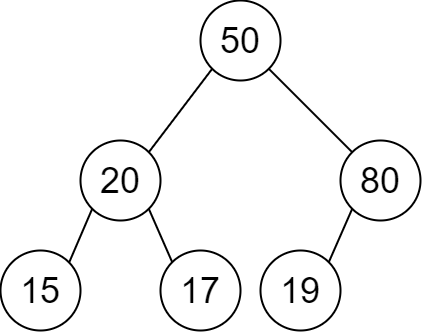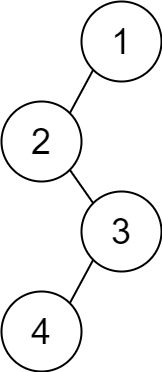Problem
You are given a 2D integer array descriptions where descriptions[i] = [parenti, childi, isLefti] indicates that parenti is the parent of childi in a binary tree of unique values. Furthermore,
If
isLefti == 1, thenchildiis the left child ofparenti.If
isLefti == 0, thenchildiis the right child ofparenti.
Construct the binary tree described by descriptions and return **its *root***.
The test cases will be generated such that the binary tree is valid.
Example 1:

Input: descriptions = [[20,15,1],[20,17,0],[50,20,1],[50,80,0],[80,19,1]]
Output: [50,20,80,15,17,19]
Explanation: The root node is the node with value 50 since it has no parent.
The resulting binary tree is shown in the diagram.
Example 2:

Input: descriptions = [[1,2,1],[2,3,0],[3,4,1]]
Output: [1,2,null,null,3,4]
Explanation: The root node is the node with value 1 since it has no parent.
The resulting binary tree is shown in the diagram.
Constraints:
1 <= descriptions.length <= 10^4descriptions[i].length == 31 <= parenti, childi <= 10^50 <= isLefti <= 1The binary tree described by
descriptionsis valid.
Solution (Java)
/**
* Definition for a binary tree node.
* public class TreeNode {
* int val;
* TreeNode left;
* TreeNode right;
* TreeNode() {}
* TreeNode(int val) { this.val = val; }
* TreeNode(int val, TreeNode left, TreeNode right) {
* this.val = val;
* this.left = left;
* this.right = right;
* }
* }
*/
class Solution {
public TreeNode createBinaryTree(int[][] descriptions) {
Map<Integer, Data> map = new HashMap<>();
for (int[] description : descriptions) {
Data data = map.get(description[0]);
if (data == null) {
data = new Data();
data.node = new TreeNode(description[0]);
data.isHead = true;
map.put(description[0], data);
}
Data childData = map.get(description[1]);
if (childData == null) {
childData = new Data();
childData.node = new TreeNode(description[1]);
map.put(childData.node.val, childData);
}
childData.isHead = false;
if (description[2] == 1) {
data.node.left = childData.node;
} else {
data.node.right = childData.node;
}
}
for (Map.Entry<Integer, Data> entry : map.entrySet()) {
if (entry.getValue().isHead) {
return entry.getValue().node;
}
}
return null;
}
private static class Data {
TreeNode node;
boolean isHead;
}
}
Explain:
nope.
Complexity:
- Time complexity : O(n).
- Space complexity : O(n).